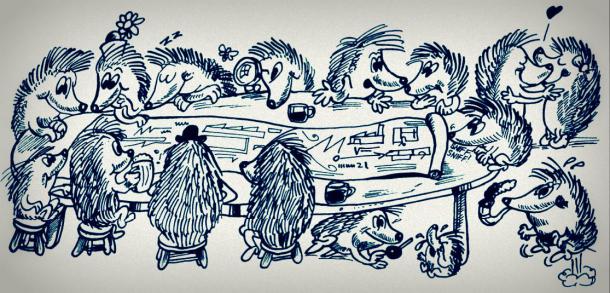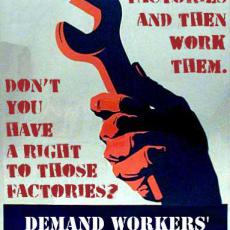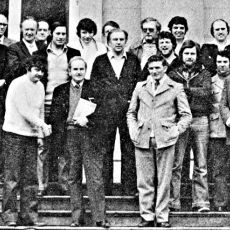The ambiguities of workers’ control
‘Merits of Workers’ Control in Industry’
Title of an article by Alasdair Clayre, The Times, September 19, 1969.
‘Workers Control exists wherever trade union practice, shop stewards sanctions and collective power constrain employers’.
Ken Coates and Tony Topham, ‘Participation or Control, p. 10, March 1969.
Workers’ Control, like charity, should begin at home… It is no use hoping for the workers to control industries if they don’t control their own unions’.
R. Challinor, ‘International Socialism’ no. 40, October/November 1969.
The working out of even the most elementary economic plan – from the point of view of the exploited, not the exploiters – is impossible without workers’ control, that is without the penetration of the workers’ eye into all open and concealed springs of capitalist economy’.
L. Trotsky, The Transitional Programme, 1938
‘In the long run Workers’ Control is a political rather than industrial concept … To accept that a man who works for an organization has the right to own it and direct it challenges the whole basis of property-owning capitalism’.
M. Ivens, The Times, December 12, 1969.
It is obvious that all those quoted [above] cannot be thinking of the same thing when they talk of ‘workers’ control’. What then does each of them mean when they use these currently fashionable words?’ Those who seek to answer this question will discover to their amazement that none of these pundits proposes a clear and unambiguous definition.
‘What do you mean by workers’ control? is a question to press on anyone now raising the slogan. Some of the usual answers are listed below. (They are discussed further on in the article.) We have grouped the answers under three-main headings:
1. Workers’ control = participation of shop floor representatives on the Board of Management of various enterprises
There are many variations on this theme. Some propose that the ‘representatives’ only be observers. Others demand for them the right to advise. Or the right to veto decisions taken by management. Or the right to participate in the taking of these decisions. Some propose that the ‘representatives’ number less than half the Board, others demand half…or more. Some would restrict their rights to dealing with technical aspects of the work process. Others would include working conditions and pay within their terms of reference. Finally some suggest that the workers’ ‘representatives’ should be union officials, or Company nominees. Still others advocate that they should be technical experts. Some propose that they should be elected from the shop floor itself.
2. Workers’ control = participation of shop floor representatives in trade union decision-making
Here too there are many variations. Some who hold this view would demand that workers be given the right to participate in union decision-making – i.e. that the unions be made ‘more democratic’, for in theory all union members have this right. Others demand the right of groups of workers to veto decisions reached ‘on their behalf’ – but without consultation -by the union Executives. Some would restrict rank and file rights to strike decisions only. Others would extend them to the right directly to negotiate about conditions of work and pay.
3. Workers’ control = an adjunct to nationalisation (‘Nationalisation under workers’ control’)
The function of ‘workers’ control’ under these circumstances is seldom spelt out. Some see it as a ‘transitional’ demand, others as a characteristic feature of a socialist society. Some see the objective of this kind of workers’ control as being to advise the ‘workers’ state’ on matters of overall economic policy – or to seek to influence such policy in a particular direction, or to ensure the smoothest possible execution of an industrial policy elaborated by the political institutions of the ‘new’ state.
Before going any further let us state here that we of SOLIDARITY reject all these meanings of workers’ control and consider them ambiguous or harmful. All these interpretations evade the key issue of decisional authority within society. For these reasons we do not in fact use the words ‘workers’ control but speak of ‘workers’ management’.
The variations on the first concept of workers’ control (‘participation in management’) all tacitly accept the authority of someone other than the producers themselves to manage production (i.e., to take the fundamental decisions). The producers are only allowed to ‘participate’ (i.e. to play a part or look in).
The advocates of this type of ‘workers control’ seem mainly concerned at ‘improving communications’ in industry. They see industrial struggle as deriving from defects in such communications rather than from an irreconcilable conflict of interests. Their models are the Joint Production Committees that became widespread during World War II.
As against this viewpoint we insist that the General Assembly of the workers in any plant, or its elected and revocable Council, should alone have all managerial authority at plant level. Regional or national federations should have authority at regional or national level. All other bodies claiming managerial rights (whether they be managers in the pay of capitalist enterprises, trade union officials, government nominees or Party bureaucrats) are parasitic and must be exposed as such. As for the technical experts – they should advise, not impose decisions. Anyone who discusses workers’ control without clearly stating his views on the authority of the General Assembly of the workers at plant level, or of the Federations of Workers Councils at higher levels, is spreading a smokescreen around the central issue.
The advocates of the second concept (‘participation in union decision-making’) argue beside the point. The rule of the Factory Council implies that they take over all the functions at present carried out both by management and by the unions. ‘Workers’ control’ is not decisional authority in the hands of union officials. The rule of the Factory Councils will make the unions as well as management redundant. That is precisely why the unions (whether democratic or not) will fight to their death against workers’ management of production.
As for the third view (‘works’ councils acting as-pressure groups to influence the. government’s national policy’) it implies the-acceptance by the workers of the authority of a political bureaucracy.
As against this we stand for Community Councils, Workers’ Councils, University Councils, Schools’ Councils, etc. – federated at local, regional and national levels – becoming the decision-making authority on every aspect of production, services, and social life. It is these Councils who must decide the what, why, and how of the workings of society, including every aspect of production. Needless to say such a state of affairs cannot be achieved without revolution. Our view of revolution is not merely the replacement of the rule of the representatives of Capital by the rule of the Revolutionary Party. For us revolution is the rule of Industrial and Community Councils. Unless the revolution transforms the entire structure of authority relations throughout society it is doomed to degenerate into the rule of an elite. Others hold entirely different ideas on ‘workers’ control. For example in a recent polemic on the subject between International Socialism and the Institute for Workers’ Control (see I.S., Oct/Nov 1969). Tony Topham of the I.W.C. declares ‘No Incomes Policy without Workers’ Control’ The author goes on to clarify his meaning by saying ‘No Incomes Policy without a Workers’ Veto’. Topham seems to consider the right of workers’ (unions? shop stewards’ committees? General Assemblies?) to veto governmental decisions as ‘workers’ control’’ or at least as some part of it. But to demand the right to veto someone else’s decisions conceals the acceptance of that ‘someone else’s’ authority to initiate the decisions in the first place. Topham concedes the very principle we are contesting. .
Raymond Challinor of I.S. rebukes Topham, but in a different vein altogether: 'It is no use hoping for the workers to control industries if they don’t control their own unions’. First control the unions, he seems to be saying, and control of the factories will perhaps come later. But what does ‘control of the unions’ mean? Challinor -believes that the unions must (and therefore presumably that they can) be made, more democratic. He explains: ‘Not only is the idea that workers representatives should receive the average pay of the men they represent intrinsic to the; concept of industrial democracy, but it is equally important that they should be subject to recall’. This is a pious hope and in contradiction with the whole historical development of the unions under modern capitalism. It ignores their gradual but irreversible integration into exploiting society. The view expressed implies moreover that Challinor expects ‘workers’ control’ to be exercised through ‘democratic unions’. Why through unions? Why not full managerial authority exercised directly by the General Assembly or its Council in the factory and through Federations of Workers’ Councils at regional and national levels? Why this fetishism of the authority of both unions and government?
The Institute for Workers’ Control considers its role mainly as ‘educational’ and ‘reformist’. It is ‘practical’ and ‘realistic’. It therefore refuses to discuss such unrealistic issues as Revolution or the rule of the Factory Councils. It accepts the present authority of the trade union apparatus and merely seeks to extend it. International Socialism on the other hand consider themselves, ‘political’ ‘revolutionary’ and can afford to ‘challenge’ the present union bureaucracy (although at election time giving ‘critical support’ to one bureaucratic faction against another).
Both I.W.G. and I.S however share a restricted view of how workers should exercise their authority. They both share'(without being aware of it?) the assumption that the basic decisions concerning production will have to be taken out of the hands of those directly involved in production and vested in the hands of some political bureaucracy (those managing the ‘nationalised’ industry). For those who accept such fundamental assumptions, ‘workers’ control’ will always be restricted to technical or supervisory functions, for it is conceived of as something separate from the question of political authority.
For us workers’ management means the same as workers power. Let us spell it out. NEITHER THE RULE OF CAPITALISTS. NOR THE RULE OF PARLIAMENT. NOR THE RULE OF THE TRADE UNIONS. NOR THE RULE OF THE ‘REVOLUTIONARY PARTY’. BUT THE DIRECT AND TOTAL RULE OF THE FACTORY AND COMMUNITY COUNCILS. In other words we stand for a society based on self-management in every branch of social life. Community and Factory Councils must take over all decision-making authority at present vested in Parliament, political parties, unions, or capitalist management.
In this we differ from all those revolutionaries (the ‘traditional left’) who stick to the idea of political authority as something separate from the productive process. We believe that the very system of rule by a separate political apparatus is redundant and that this apparatus will be replaced – in the revolutionary process – by the direct rule of the Councils. All political organisations who will attempt to build a separate power structure outside of the Councils will be challenged by the Revolution as just another set of external manipulators. For workers’ power challenges not only property-owning capitalism but the very separation of political authority from production. Sooner or later all revolutionaries will have to choose between ‘All Power to the Councils’ and ‘All Power to the Party’. Their choice will determine not only their political role but also their historical future.





Comments
Post new comment